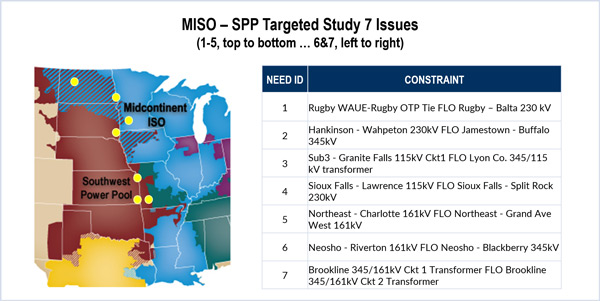SPP and MISO continue to study seven potential joint transmission projects across their seam, but much of their focus is now turning to developing the 2017 joint study by next April.
Staff from the two RTOs told their Interregional Planning Stakeholder Advisory Committee on Friday that they have already begun to put together a work plan that includes a study scope, timeline and Tariff and joint operating agreement changes needed to accommodate the study.
RTO staffers met in October at MISO’s Louisiana offices to lay out a high-level framework for the study, which would end in 2019. Staff hope to improve coordination of their regional processes and sharing of regional planning assumptions.
“As we develop our regional plans individually, we would start developing regional candidate projects,” said MISO’s Davey Lopez, advisor of planning coordination and strategy. “Both parties agreed we want to plan for the best value, which may not be the cheapest solution.”
Lopez and his counterpart, SPP Interregional Coordinator Adam Bell, said their boards would be able to evaluate the regional projects and interregional projects on the same timeline, eliminating one of the stakeholder complaints in recent years.
“One of major hurdles we have is the timing of the regional processes,” Bell said. “Both sets of stakeholders will be able to look at regional and interregional plans at the same time, and pick the best project. One is not winning out by virtue of finishing first.”
Lopez told the IPSAC that the 2017 study will begin as the 2016 coordinated study process ends, using the latter’s study results as an input. “We’d like to ramp it up in April 2017, hit the ground running and jump right into another study,” he said.
The 2016 analysis has resulted in seven potential projects, primarily in the Dakotas and along the Kansas-Missouri border. Lopez said the list may be reduced further but that it is “good information for the 2017 study.”
Three of the projects would solve market-to-market flowgates, which have resulted in payments from MISO to SPP totaling $2.75 million.
Nine entities have submitted 32 solution ideas to address the project needs posted in October. Several of the solutions were duplicates of, or similar to, others.
Final study results will be shared with the IPSAC during its next meeting, tentatively scheduled for February.
Competitive Tx Process Task Force Suggests Criteria Change
The Competitive Transmission Process Task Force completed its review of the documents to be used by transmission developers bidding on projects through SPP’s Order 1000 competitive process.
Stakeholders determined that the inflation rate (2.5%), discount rate (8%) and operations and maintenance escalation rates should be prescribed by SPP in its solicitation.
Duke Energy’s Bob Burner proposed the group use a “pass-fail” grading system rather than point-scoring for certain qualitative items evaluated by the industry expert panel (IEP).
Staff noted the Tariff language gives the IEP sole discretion in determining how it scores competitive proposals but agreed to recommend to the panel which items should fall into the pass-fail category. Staff will draft a revision request that would remove certain pass-fail items from the solicitation process. Points allotted to the scoring categories would not be impacted.
The task force will meet again Jan. 9, in preparation for the Markets and Operations Policy Committee meeting two weeks later.
Gas-Electric Coordination Report Filed with FERC
SPP on Friday filed with FERC its first informational report on the RTO’s efforts to coordinate gas and electric scheduling practices. Staff shared a draft of the report two weeks ago with the Gas-Electric Coordination Task Force. (See “SPP to Deliver Positive Report to FERC on Gas-Scheduling Practices,” SPP Briefs.)
The report was filed to comply with FERC Order 809, which required RTOs to improve the alignment of their market schedules with those of interstate gas pipelines (RM14-2). SPP’s changes took effect Sept. 30.
SPP Sets New Winter Peak Mark
SPP set a new winter demand peak earlier this month, hitting 37,780 MW at 7:21 a.m. Dec. 9. The mark broke the previous record of 37,412 MW set Jan. 18.
– Tom Kleckner





